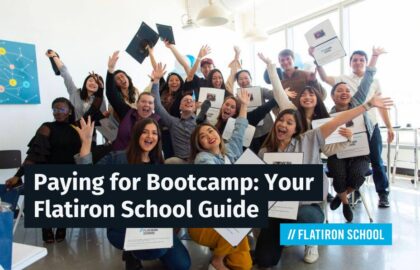This article on networking is part of the Coaching Collective series, featuring tips and expertise from Flatiron School Career Coaches. Every Flatiron School graduate receives up to 180 days of 1:1 career coaching with one of our professional coaches. This series is a glimpse of the expertise you can access during career coaching at Flatiron School.
“…you mean I’m supposed to just call up someone I don’t know and ask them for a meeting? “
“Yes,” I say in my most matter-of-fact tone.
I can tell by the look on his face he doesn’t believe me or, if he does, there’s no way he’s going to act on my recommendations without some more support. So, I take a deep breath and settle in to explain.
Reframing Networking
This is the way many of my coaching sessions on networking start. Networking, it’s a word that gets tossed around quite a bit but what does it really mean? When used as a verb, networking conjures up other words like pushy, presumptuous, creepy, or stalking – that last one I hear the most from Flatiron School graduates while preparing them for their job search.
While the old adage “it’s not what you know, it’s who you know” is true, it’s also cold comfort if you don’t know anyone – anyone connected to tech or a software engineering job anyway.
I’m officially changing that saying to “it’s not what you know that is going to lead to your next job, it’s who you are going to meet that will lead to your next job.” This reframe is much more realistic and easier to put into action because networking is just another way of describing relationship building.
So, how to get started? Making digital connections, accumulating likes, and creating engagement with posted content are all tactics that support networking but that alone is not enough to build human relationships.
“The Connector’s Way,” by Patrick Galvin, an expert relationship builder, keynote speaker, and co-founder of the Galvanizing Group, outlines the following Seven Rules for Building Business One Relationship at a Time.
1. Nurture the body and mind to create positive energy that attracts others.
Albert Einstein famously said, “Everything is energy, and that’s all there is to it. Match the frequency of the reality you want and you cannot help but get that reality. It can be no other way. This is not philosophy, this is physics.” Be the sort of person with whom you would like to engage. You’ll find that others who match your frequency will show up on your radar making it easy to connect.
2. Seek out individuals who expose you to new ways of thinking.
Being open to different perspectives and learning how to re-frame an existing paradigm is one of the most powerful ways to learn about the universe of opportunities that lie just outside of your awareness. There are advantages and disadvantages to every state of being that exists. Seek out those likely to have a different perspective on your perceived advantages and disadvantages to expand your worldview.
3. Ask your connections how you can be of service to them.
This is important! Many of the job-seeking grads I meet forget that they bring value to the table. We have intrinsic value in our humanity and life experiences. Don’t be surprised if your obscure hobby or interest in a certain topic has value to someone else.
4. Serve others without consideration for how you will benefit.
This rule is closely related to the previous one. And I promise you, when practicing rule #4, you will benefit in some way. Also, see Rule # 1 and what Einstein said about energy and attraction. Being of service feels good and feeling good is a benefit in and of itself.
5. Exceed expectations.
People remember those who go above and beyond the expected norm. Be memorable. Engage in excellence to the best of your ability.
6. Let people know how they can help you succeed.
People generally enjoy helping others succeed, but they can’t read your mind to know what you need – make it easy for them. For graduates of FIS, this can be as general as asking “who else do you recommend I speak with?” or as specific as “I’m hoping you will pass my resume to the hiring manager and endorse my qualifications for the job.”
7. Be grateful.
Gertrude Stein said, “Silent gratitude isn’t much use to anyone.” Gratitude in action is called appreciation – and everyone wants to be appreciated. Acknowledging others in meaningful ways is one of the most powerful ways to build connections that last a lifetime.
Of all these seven rules only one (Rule Six) involves asking someone for something, all the others are things completely within our control. Play the long game for your career.
Begin a practice of nurturing your professional relationships early, maintain the connections and what you put out will come back in surprising and extraordinary ways.
About Dyana King
Dyana King is a career coach with Flatiron School. She previously worked as a technical recruiter and co-founded a technical recruiting agency, Thinknicity. She became a certified professional coach (CPC) in 2012 and specialized in transition and career engagement coaching.




